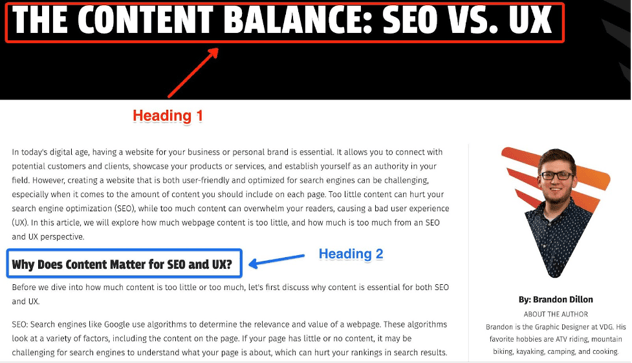On-page Search Engine Optimization (SEO) can contribute to countless new visitors finding your website. While implementing or updating SEO elements can be helpful, some are more influential or foundational than others when it comes to your ranking. But, with more than 200 different factors impacting how your site ranks in search engine results, where do you even start?
If you're unsure which elements to start with, we've written this blog to help guide you through page titles, headings, and meta descriptions – the 3 easy elements of SEO you should focus on first.
What is SEO and Why’s it Important?
On-page SEO, or on-site SEO, is the process of optimizing various front-end and back-end components of your website for both user experience and search engines. This is important because optimizing your website will help deliver better signals to search engines, so that your content can be properly indexed and displayed within a potential customer’s search results.
SEO Elements to Start With
The main focus of on-page SEO is to provide search engine crawlers with the information they need to understand the meaning and context of your content. Search engines don’t read pages like a human, instead they crawl pages for certain factors to determine relevance and value. This is where page titles, headings, and meta descriptions come into play. That information is used to build an index that is then fed through an algorithm that attempts to match the data to someone’s specific search query.
Here’s how optimizing your page titles, headings, and meta descriptions for these algorithms can increase the chance of your site being seen by a potential consumer.
- Page Titles: Strong page titles help improve your website’s SEO and the user experience because of its prominence on the page. Search engines need a page title to accurately index a web page in search results. Alternatively, internet users need a page title so they can see an accurate and concise description of a page’s content before viewing it. A great page title can also keep readers engaged and help increase the amount of time a reader spends on your website. This is because a visitor who quickly finds what they are looking for on your site, is more likely to engage with additional pages and spend more time reading your content. A page title written for SEO should: include relevant keywords, be around 60-70 characters in length, be specific enough for your readers, and not be repetitive.

- Meta Descriptions: Meta descriptions are the short page descriptions that appear under the page title in search results. They are important because they help increase organic traffic and bring more eyes to your webpages. If there are search keywords in that text, they will be bolded. If you don't include a meta description, most search engines will display a snippet of text from the first paragraph of content on the page. This isn't necessarily a bad thing, not including a meta description just means you’re missing out on the chance to personalize what readers will see in their search results. A meta description written for SEO should: summarize the content of the page, include keywords in the first sentence in a natural way, and be around 140-160 characters in length.

- Headings: Headings refer to the HTML element <h1>, <h2>, <h3>, and so on. You may think that headings are inconsequential in the grand scheme of things. However, they can help provide structure to a piece of content and call attention to the most important ideas, themes, and (in effect) keywords in that content. Headings also make pages easier to read. Sectioning off different parts of a webpage keeps information organized and broken up in a comprehensible way. This helps readers find information they're looking for but also search engines which are scanning along, too. SEO best practice is to incorporate important keywords in your headers that are similar to what's in your page title, but not exactly the same. For example, let's say your keyword is "SEO." You'd want this to be reflected in your H1 tag (i.e your page). Saying something like "A DIY Guide for SEO'' would be ideal. Then, you might create some H2 sections surrounding popular long-tail keywords related to SEO, like "steps for creating an SEO strategy" or "the best tools and plugins for SEO."

DIY SEO at your Fingertips!
By optimizing your page titles, headings, and meta descriptions for search engine algorithms you can increase the chances of potential customers finding your website. These 3 SEO elements are a great place to start when it comes to improving your site's ranking in search engine results pages. Just remember that there are over 200 different factors impacting how well your website ranks. So, make sure you continue exploring other areas such as upgrading user experience, optimizing your content, redesigning your website, and more to ensure maximum visibility for all of the hard work you’ve put into creating an amazing online presence. With these tips in mind, get ready to take on SEO like never before!



